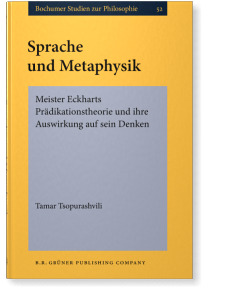Sprache und Metaphysik
Meister Eckharts Prädikationstheorie und ihre Auswirkung auf sein Denken
This study aims to present Meister Eckhart’s metaphysics in a systematic way and to identify the common basis that makes apparent that his speculative Latin works and his German works, which are full of pictorial expressions, are compatible with each other. The innovative approach of this study lies in its attempt of systematization on the basis of the medieval theories of language. This approach identifies different ways of understanding Meister Eckhart’s key predicative propositions, which are the main theses of his metaphysics. Predication can be understood according to the theories of inherence, or identity, resulting in different meanings of the same sentence. This has great impact on Meister Eckhart’s concept of God and his attitude toward negative theology. The book shows in great detail how predication is at the root of understanding the main theses of Meister Eckhart’s metaphysics, which – as is exemplarily demonstrated – is also constitutive for his German works.
Table of Contents
-
Vorwort | pp. vii–viii
-
Einleitung | pp. 1–11
-
1. Die zwei Sprachmodelle im Mittelalter | pp. 13–25
-
2. Die Bedeutung von negatio negationis | pp. 27–34
-
3. Die Satzstruktur von „Unum est negatio negationis“ | pp. 35–85
-
4. Die Auswirkung der Prädikation auf die Grundsätze der Metaphysik | pp. 87–146
-
5. Eckharts Deutsche Werke und ein weiterer Ort der Thesen seiner Metaphysik | pp. 147–171
-
-
Sachregister | pp. 183–186
-
Namenregister | pp. 187–188
Cited by (1)
Cited by one other publication
This list is based on CrossRef data as of 18 july 2024. Please note that it may not be complete. Sources presented here have been supplied by the respective publishers. Any errors therein should be reported to them.
